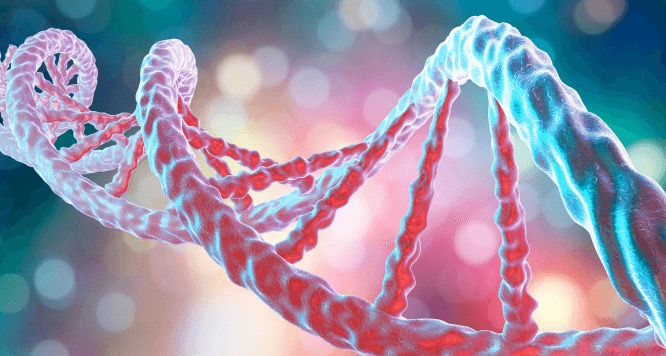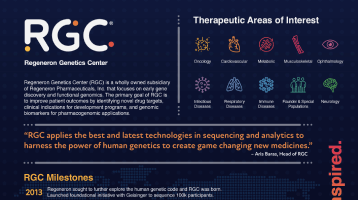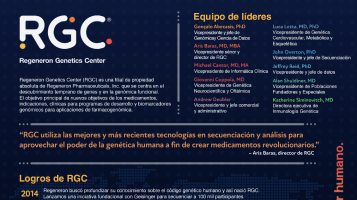Regeneron Genetics Center: Genetics to Therapeutics, Designed For All
Purpose-driven genomic research
At Regeneron Genetics Center® (RGC), we are harnessing the power of human genetics to discover important new medicines, validate existing research programs and optimize clinical trials.
We tap into our growing database of nearly 3 million sequenced exomes and deidentified health information using proprietary data analytics, technology and human ingenuity to make meaningful biological discoveries at speed and scale.
Our high-touch integrated model focuses on working closely with our collaborators to build a dataset with meaningful cohorts. We use innovative technologies, such as machine learning, to sequence exomes, align with health information and perform large-scale analyses to make meaningful associations between genes and diseases. As a wholly owned subsidiary of Regeneron, we apply our insights to guide Regeneron’s broader drug discovery and development efforts.
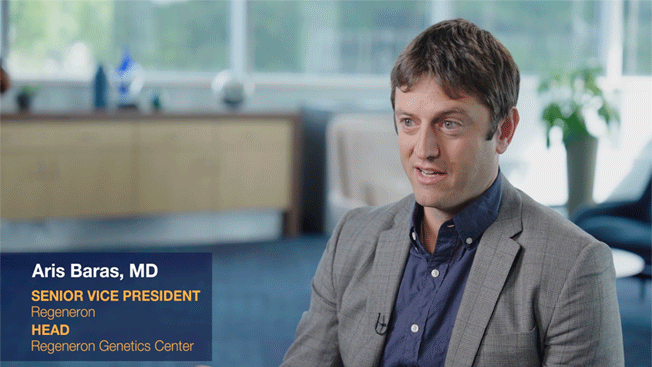
Building a global genetic database
Genetic databases function best as global resources when they reflect humanity’s broad spectrum of ethnic, racial and genetic diversity. Essential to their creation are global collaborations, which allow us to compile a representative dataset that enables us to uncover meaningful differences, including genetic mutations found only in certain populations that may cause or protect against disease. We are committed to responsibly enhancing representation in genomic research, as reflected in our 150+ global collaborations.

Historically, genomic research has over-indexed in studying people of European ancestry,1 creating gaps in our understanding of the genetic drivers of disease for other groups of people. With the ultimate goal of speeding up drug discovery and development for everyone, we are working with collaborators to enable access to more cohorts around the world to better understand the nuances of human genetics and biology while maintaining a high level of transparency and collaboration with local organizations and patients.
Access our genomic databases to learn more about the insights that drive our discoveries:
Mexico City Prospective Study Variant Browser
Genetic variations observed in 9,950 whole genome sequenced individuals and 141,046 exome sequenced and genotyped individuals from the Mexico City Prospective Study (MCPS). Updated as of January 2023.
1 Million Exome (ME) Variant Browser
Allele frequencies for six continental ancestries, stratified by sub-continent and region. Updated as of May 2023.
COVID-19-Related Phenotype Browser
Genetic association analysis of COVID-19 phenotypes from various studies. Updated as of March 2021.
Human genetics guiding actionable discoveries
Genomics has the potential to revolutionize how we approach drug discovery and development to find better ways to treat and prevent disease. And that is why RGC’s mission — genetics to therapeutics, designed for all — has allowed us to grow and maintain one of the world’s largest, most comprehensive genomic databases.
Guided by data and analytics, our exploration of human genetics leads us to transformative discoveries and, ultimately, the development of cutting-edge therapeutics.
Explore the impact of key discoveries:
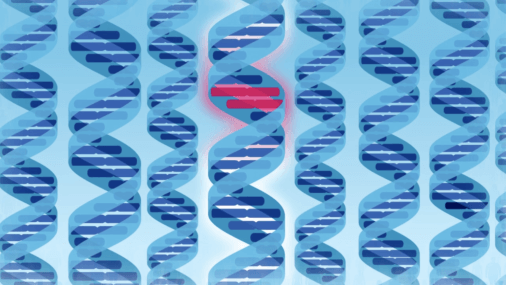
Rare mutation in GPR75 gene associated with reduced risk for obesity
Through the genetic sequencing of nearly 650,000 people, our scientists discovered a rare genetic mutation in the GPR75 gene that is associated with reduced risk for obesity. We are pursuing therapeutic development programs using antibody, RNAi and small molecule approaches.
Missense mutation in BRCA1 gene linked to breast and ovarian cancer
By studying a founder population of Orcadians, we identified a pathogenic missense mutation in the BRCA1 gene, variant V1736A, linked to cases of breast and ovarian cancer.
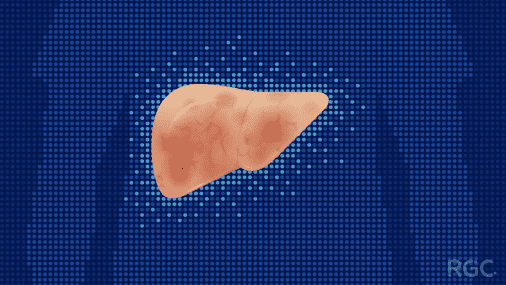
Rare mutations in CIDEB and HSD17B13 genes found to combat nonalcoholic steatohepatitis (NASH)
CIDEB: We identified rare mutations in the CIDEB gene and discovered that those with one mutated copy of CIDEB had a 53% lower risk for nonalcoholic steatohepatitis (NASH). We are conducting preclinical research to develop a new medicine using an siRNA (gene silencing) approach.
HSD17B13: We discovered a mutation in the HSD17B13 gene that protects from liver disease. We are now studying a new RNAi therapeutic, ALN-HSD, targeting HSD17B13 in clinical trials.
Innovative technologies
Our innovative technologies enable us to quickly and effectively sequence exomes and analyze data. Through human ingenuity, machine learning, artificial intelligence and more, we maintain one of the biggest genome centers in the world.
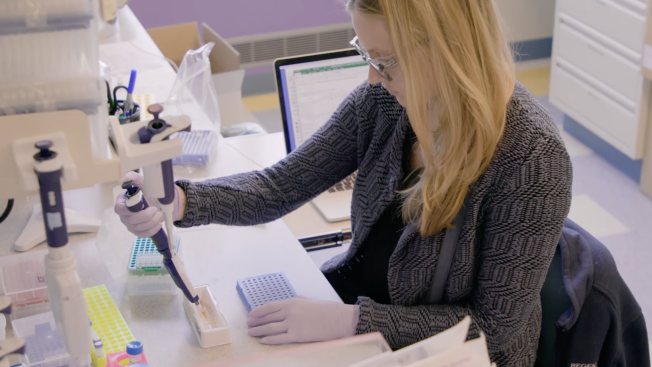
Data technology
When it comes to our data technology, our goal is to minimize friction between the data and the insights we’re trying to glean.
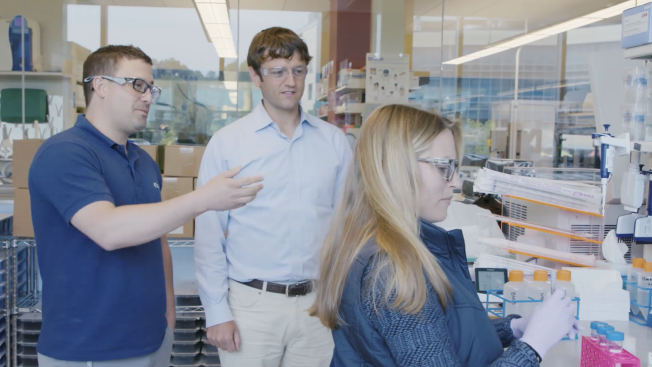
Our approach to genetic sequencing
Our sequencing efforts are growing at a rapid pace, thanks to collaboration amongst teams to streamline the sample preparation and sequencing process.
Patient impact
Our ultimate goal is to make a positive impact on patients – both in the short-term through results returned via collaborators, and in the longer term by informing research into new medicines.
As we identify interesting findings from our research, we share it with other teams at Regeneron to accelerate our drug discovery and development process. Sometimes this data validates what we've already seen in other ongoing research, and other times it informs new avenues of research for potential therapies. Either way, our genetics research makes us more nimble and targeted when it comes to pursuing new medicines for people with serious diseases.
MyCode saved my life
Barbara Barnes is alive today because she contributed her genetic information to a research project. On her doctor's recommendation, the 58-year-old Hazleton, Pennsylvania, homemaker gave a blood sample in April 2016 to a growing biobank called the MyCode Community Health Initiative. Based at Geisinger Health System in Danville, Pennsylvania, its goal is to help health care professionals develop more targeted, effective treatments for patients. Barnes' DNA joined that of over 150,000 volunteers who are notified if genetic changes are found in their information associated with conditions that can then be treated.
Additional Resources
Learn how our team is using genomic approaches to improve patient care.
Keep up with RGC’s people, latest news and all things genetics:
References
- Taylor, D.J., Chhetri, S.B., Tassia, M.G. et al. Sources of gene expression variation in a globally diverse human cohort. Nature 632, 122–130 (2024). https://doi.org/10.1038/s41586-024-07708-2
